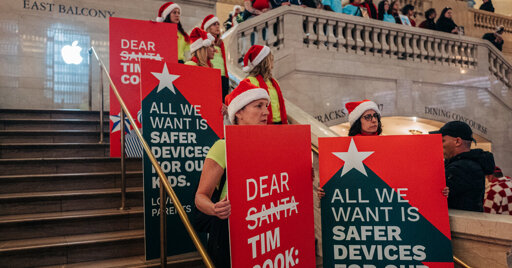After confirming the authenticity of the Bigo livestreamer with the authorities, The Times searched the Apple and Google app stores for other video chat apps. Reporters identified a sample of more than 80 apps that advertised children before stopping the search. They later contacted Homeland Security Investigations, the government’s main law enforcement group for international exploitation, for comment.
“The number one customer base paying for this abuse is in the United States,” the agent said. “It’s not like they are abused once a day. It’s 50 men getting 50 separate shows. They’ll wake up these kids in the middle of the night to be abused.”
Asked about The Times’s sample of offending apps, Mr. Sainz said a majority had been detected during the company’s standard review process, with an additional 20 taken down after an internal investigation in response to The Times’s findings.



A few years ago I conducted an internal months long investigation into Bigo Live and about a dozen remarkably similar apps. They were cookie cutter template apps with slight tweaks to test market trends and engagement, all produced by one single corporate entity: ByteDance. While sharing my findings with the team did result in new child endangerment policies being enacted internally, it is absolutely disgusting to see these apps are still at large, getting worse, and the massive tech company I worked for did essentially nothing to help externally.
EDIT: I should note the content I encountered was not abuse, but very apparent and out in the open grooming, in apps where a user’s location would often be shown publicly
How is Bigo linked to ByteDance?
Fair question I should clarify: ByteDance was using a number of LLCs at the time to (my understanding) find the best / most addictive TikTok-style app. I believe TikTok was around at the time but it was called something different. Looking into this briefly again, it seems Bigo isn’t directly connected to ByteDance, but the exact style/format of app is apparently being abused by multiple companies across countries now.
So was anything in your original comment actually true?
Sure, everything except the direct connection between Bigo specifically and ByteDance. Like I said originally, there were numerous apps that I found platforming this behavior, and TikTok’s parent company was responsible for most of them. This was several years ago (~5) and I’m going off memory here, so I do apologize for the inconsistency
TikTok used to be Musical.ly and it was far more niche than what TikTok is today. It was populated primarily by tweens and it was for making musical lip-sync videos.
TikTok was Douyin, which *acquired * musical.ly to get into the US market.